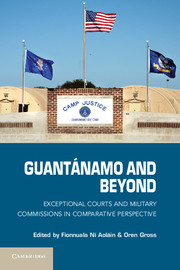Book contents
- Frontmatter
- Contents
- Contributors
- Acknowledgments
- Introduction: Guantánamo and Beyond
- Part I Military Commissions and Exceptional Courts in the United States
- Part II Exceptional Courts and Military Commissions Elsewhere
- 9 The Law Working Itself Pure? The Canadian Experience with Exceptional Courts and Guantánamo
- 10 Vicious and Virtuous Cycles in Prosecuting Terrorism
- 11 Terrorism Prosecution in the United Kingdom
- 12 Trying Terrorists
- 13 Exceptional or Not? An Examination of India's Special Courts in the National Security Context
- Part III International Law, Exceptional Courts, and Military Commissions
- Index
- References
10 - Vicious and Virtuous Cycles in Prosecuting Terrorism
The Diplock Court Experience
Published online by Cambridge University Press: 05 June 2014
- Frontmatter
- Contents
- Contributors
- Acknowledgments
- Introduction: Guantánamo and Beyond
- Part I Military Commissions and Exceptional Courts in the United States
- Part II Exceptional Courts and Military Commissions Elsewhere
- 9 The Law Working Itself Pure? The Canadian Experience with Exceptional Courts and Guantánamo
- 10 Vicious and Virtuous Cycles in Prosecuting Terrorism
- 11 Terrorism Prosecution in the United Kingdom
- 12 Trying Terrorists
- 13 Exceptional or Not? An Examination of India's Special Courts in the National Security Context
- Part III International Law, Exceptional Courts, and Military Commissions
- Index
- References
Summary
THE EVENTS OF 9/11 HAVE LED TO SUCH AN EXTENSIVE literature on the resort to emergency powers at both the national and international level that there has been a tendency to forget that before 9/11 a number of countries experienced their own forms of terrorism that in themselves led to a literature at the national level. September 11 globalized the so-called war on terror and put center stage questions about responses to terrorism that have in truth been going on for some time. Contributors to this book, such as Steven Greer and Clive Walker, have made major contributions to the pre-9/11 literature on the exercise of emergency and terrorism powers in the United Kingdom and Ireland.
One of the advantages of focusing on this literature is that with a longer focus and wider lens it can provide lessons on responses to terrorism over a longer period than simply since 9/11. Some have drawn attention to the truly horrific scale of the new global terrorism, differentiating it from the domestic terrorism of the past. Two differences are said to stand out: the scale of the threat – the fact that the global terrorist may strike anywhere with the potential to use weapons of mass destruction; and the fact that today's global terrorists are prepared to sacrifice their own lives. Consequently, it has been argued by Paul Kahn that the reaction of national states has been all the more punitive. A vicious cycle has emerged whereby terror is followed by torture and principles such as the rule of law and human rights are sacrificed and replaced with talk of how we should respond to ticking time bombs. In an argument akin to Tony Blair's claim after the United Kingdom's 7/7 that the “rules of the game are changing,” Kahn argues that 9/11 put an end to the narrative of the triumph of a global order on the basis of the rule of law that was holding sway at the end of the twentieth century – the idea that the new post–World War II legal order would progress from the UN Declaration of the Rights of Man to the more detailed covenant on Civil and Political Rights and finally to enforcement through the International Criminal Court. Instead terror reemerged, torture was resumed, and the politics of national sovereignty reasserted itself.
- Type
- Chapter
- Information
- Guantánamo and BeyondExceptional Courts and Military Commissions in Comparative Perspective, pp. 225 - 244Publisher: Cambridge University PressPrint publication year: 2013



